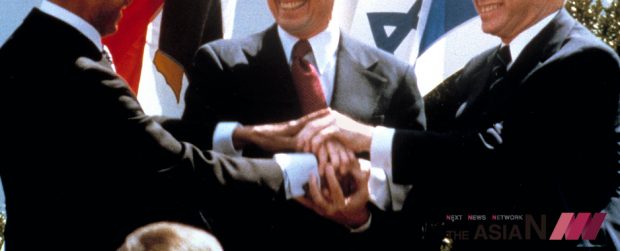
40 Years of Fake Peace and Illusion Wars
On 9 November 1977, late Egyptian President Sadat (born December 25,1918, assassinated October 6, 1981), startled the world by announcing to his parliament his intention to visit Jerusalem and speak before the Knesset (the unicameral national legislature of Israel), seeking genuine peace.
The initiative was prepared by the US political kitchen, and shortly afterward, the Israeli government cordially invited Sadat to address the Knesset in a message passed to him via the US ambassador to Egypt. Ten days following that speech, Sadat arrived for the groundbreaking three-day visit, which launched the first measure towards peace between the occupying State of Israel and an Arab country Sadat’s trip to Jerusalem signaled a major reorientation of Cairo’s place in the global scheme of things from the Soviet to the American camp. The gesture stemmed from an eagerness to request the help of NATO countries in improving the ailing Egyptian economy, a progressive belief that Egypt should begin to focus more on its own interests than on the interests of the Arab world, and a hope that an agreement with Israel would catalyze similar agreements between Israel and her other Arab neighbors to further solve the Palestinian problem. Accompanied by their capable negotiating teams and with their respective interests in mind, Sadat and the Israeli Prime Minister converged on Camp David for 13 days of tense and dramatic negotiations from 5 to 17 September 1978. By all accounts, Carter’s relentless drive to achieve peace and his reluctance to allow the two men to leave without reaching an agreement were what played the decisive role in the success of the talks.
As a result, the agreement was signed, but it opened a new page in the relationships book, as Arab countries then proceeded to cut diplomatic ties with Cairo; the kind of “peace” Sadat envisioned did not appear. National Egyptian powers and Egyptian citizens alike started a public boycott to what was beginning to be called Israeli normalization. It seemed many were not able to forget the horrible crimes committed by Israeli forces before and after the 1967 war. Such opposing sides even went on to consider their victory in the 1973 war against the Israelis had been crushed by Sadat’s “fake peacemaking”. For cooperating with American politics, Sadat also had to fight the Soviet wing present back in Egypt. Although he thought that by releasing fundamental Islamists he could quiet down Marxist and Socialist factions, thereby winning domestic peace, those same Islamists assassinated Sadat on October 6, 1981, commemorating the 1973 war. Hosni Mubarak would continue the peace march, albeit a cold one that could not be seen as genuine. The difference with this new leader was the mega growth of Islamists, together with troops of hundreds of thousands of militants who fought in Afghanistan—a wave supported by the Taliban, then al-Qaeda, and later on, ISIS. Now, with the shifting war terrains to Arabic regions, Islamic militants have spread their new crimes to Iraq, Syria, Libya, and to Sinai in Egypt. The defense budgets of many world states, at first glance, suggest fighting terrorism is of their utmost priority, but the critical point here is: with the two great powers, NATO and Arab countries, both fighting terrorists, somewhere in between, the terrorism inside nations are being enabled, allowing negative forces to continue their war crimes.
When the Egyptian military began to spread throughout Sinai to stop terrorists, after the fall of their terror-supportive regime in Cairo (The Muslim Brotherhood), Egyptian forces suffered too many casualties in soldiers and policemen. It was said in a recent New York Times article, “Egypt appeared unable to stop them, so Israel, alarmed at the threat just over the border, took action…for
more than two years, unmarked Israeli drones, helicopters, and jets have carried out a covert air campaign, conducting more than 100 airstrikes inside Egypt, frequently more than once a week and
all with the approval of President Abdel Fattah el-Sisi”. So, 40 years after an era of fake peace, it rather looks like the old enemies are standing on the same side, fighting an illusion of wars. In previous decades, there truly was no peace, publicly and domestically. Now, there will be no winner in a war that has ensued from the aftermath, as no world power has decided to take any lasting measures. As long as these illusion wars continue to feed the arms factories, and as long as the problems are somewhere far away—away from the decision makers’ own countries, nothing much is likely to change.






